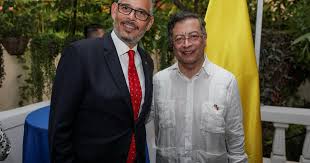
Colombian President Petro Visits Haiti to Support Security Efforts Amid Gang Violence

 :
| Updated On: 21-Jul-2025 @ 11:33 am
:
| Updated On: 21-Jul-2025 @ 11:33 amSHARE
Colombian President Gustavo Petro visited Haiti for the second time in 2024, reinforcing his country’s support amid the deepening crisis caused by gang violence in the Caribbean nation. His visit, which began on a Friday, was aimed at strengthening bilateral ties and addressing major issues such as security, commerce, education, agriculture, and drug trafficking.
During the visit, Petro officially announced the opening of a Colombian embassy in Haiti’s capital, Port-au-Prince—a symbolic move reflecting Colombia’s commitment to closer diplomatic and strategic relations with Haiti. In a passionate speech at the new embassy, Petro questioned why such a mission had not been established earlier, suggesting that racism and historical prejudice may have played a role, as Haiti was the first country to inspire Colombia’s independence through a successful slave-led revolution.
Security cooperation was a key highlight of the visit. Petro offered to help strengthen Haiti’s weak security forces by training Haitian officers. In line with this, Haitian delegations had previously toured Colombia’s state-owned arms manufacturing facility to understand the country’s defense capabilities. These steps come at a time when Haiti is grappling with severe lawlessness. Around 90 percent of Port-au-Prince is currently under gang control, and violent groups are rapidly expanding their grip across the central region of the country.
Petro was accompanied by key Colombian officials, including Defense Minister Pedro Sanchez. He met with Haiti’s Prime Minister Alix Didier Fils-Aime and the transitional presidential council. The council is facing growing international and domestic pressure to organize general elections before February 2026. Petro’s visit occurred just days after Haitian authorities seized over 1,000 kilograms of cocaine and killed four suspected drug traffickers—one of the country’s biggest drug busts in recent years. Haiti’s police force, though under-resourced and understaffed, is receiving assistance from a United Nations-backed mission led by Kenyan forces to combat escalating gang violence.
The scale of the humanitarian crisis is staggering. According to a recent UN report, at least 4,864 people have been killed between October and June across Haiti. Hundreds of others have been kidnapped, raped, or trafficked. The intensifying gang violence has also displaced about 1.3 million people in recent years, worsening an already fragile humanitarian situation.
This was Petro’s second visit to Haiti this year, the first being in late January. In preparation for his earlier visit, Haitian authorities invested approximately $3.8 million to improve the infrastructure in Jacmel, including expanding the airport runway, renovating parts of the town, and restoring electricity to communities that had lived in darkness for at least three years.
Additionally, the relationship between the two countries has been deepening due to ongoing judicial cooperation. Haitian judges are currently interrogating 17 former Colombian soldiers accused of participating in the assassination of Haitian President Jovenel Moïse in July 2021. This case continues to strain Haiti’s fragile legal and political systems but has also created an avenue for deeper engagement with Colombia on law enforcement and justice issues.
Overall, Petro’s visit signaled a strong message of solidarity and regional cooperation at a critical time in Haiti’s history.